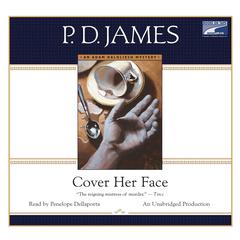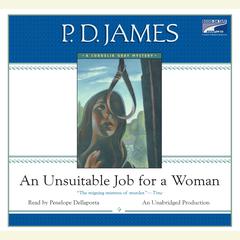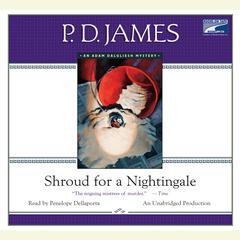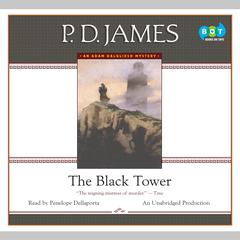 Play Audiobook Sample
Play Audiobook Sample
The Children of Men Audiobook
 Play Audiobook Sample
Play Audiobook Sample
Quick Stats About this Audiobook
Total Audiobook Chapters:
Longest Chapter Length:
Shortest Chapter Length:
Average Chapter Length:
Audiobooks by this Author:
Publisher Description
The Children of Men begins in England in 2021, in a world where all human males have become sterile and no child will be born again. The final generation has turned twenty-five, and civilization is giving way to strange faiths and cruelties, mass suicides and despair. Theodore Faron, Oxford historian and cousin to the omnipotent Warden of England, a dictator of great subtlety, has resigned himself to apathy. Then he meets Julian, a bright, attractive woman, who wants Theo to join her circle of unlikely revolutionaries, a move that may shatter his shell of passivity.… And maybe, just maybe, hold the key to survival for the human race.
Download and start listening now!
"Saw the movie first and loved it (who doesn't love Alfonso Cuaron?). But then we had a display at the library called "The Book Was Better" and I decided to grab it. It veers differently from the movie; so much so that the movie in the end is described as being "based on" the book more so than a straightforward adaptation. But I'll say it's one of the rare works that was good onscreen and on the page. Of course the book would give far more detail into Theo's life and background, but in some ways, the details of this little dystopia were far more grizzly than the movie. Flagellators, mass executions of the elderly, people transferring their love for children into their pets and into baby dolls. A nice twist that was completely omitted from the movie but turned into an excellent meditation on the ways in which absolute power corrupts. Well-played P.D. James, well played."
— S. (4 out of 5 stars)
The Children of Men Listener Reviews
-
" If she used one more poorly placed simile, I was going to throw the book out the window. Excellent plot, great premise, and decent character development. I wish I could stand the author's writing style. "
— Kaeli, 2/19/2014 -
" I hate reading a book after I've seen the movie. It takes me forever to read because I have no need to know what happens next. While the book is very different from the movie, it follows the storyline close enough to not keep me at the edge of my seat. I love this idea though. A different kind of dystopian world. Everyone is sterile, the human race will be extinct, while all other life forms seem to continue to move on. It does a good job of putting you in the mind set though. I was able to see how people might just stop caring. You still have your whole life to live, but if humans are going to be gone in a few decades anyway, then who really cares what we do. "
— Shaina, 2/5/2014 -
" This is very different than the film but as good in its own way. "
— Drew, 2/1/2014 -
" I initially started reading this book because I'm a big fan of the movie. However, the two are so drastically different, they shouldn't even be compared to each other. The narration is written as journal entries of the main character (Theo) for about a third, and then third person for the other two thirds. I can understand why P.D. James would be drawn to the journal style of first person narration (Theo is relatively self-obsessed at the start) but the events that continue are so tense and plot drive that it would be unreasonable (and unbelievable) for Theo to keep up the entries. (I think James new this as well and completely abandons the journal entries towards the end.) Despite this flaw, I think it was a good book. I appreciated the descriptions of nature encroaching on a dwindling human population and the writing contained numerous compelling, wholly unique lines. It was also nice to see a dis-topian society in the future where things were actually on the technological and sociological arc I could imagine (cars are efficient but don't hover, TVs are actually high-definition, government is ever present but not all knowing, etc.). It's a compelling story that is paced like a mystery, so it reads quick but will keep you thinking well after you've put it down. "
— Andy, 1/31/2014 -
" The movie was much better than the book "
— Paule, 1/31/2014 -
" Very different to the film but not in a bad way but it wasn't better either. They are so different (apart from not being able to have babies) that you can enjoy both separately without one spoiling the other. The book is more slow paced but you get more details about the situation. There are no big action scenes here. I think how they deal with criminals in the book is a really good idea! I have no idea why anyone would be against that. Aprat from the silly left wing five fishes. They didn't really have a clue and apart from Miriam they were all pretty annoying. Would have liked an ending where they skipped to the furture so we could know if the human race was getting back on track or if it was just a one off and the child was doomed to live our his days totally alone. "
— Redfox5, 1/19/2014 -
" One of the very few examples of 'the film is better than the book'. "
— Devon, 1/15/2014 -
" Pretty good totally different from the film of the same name but an interesting point of view. "
— John, 1/1/2014 -
" Dystopia is not a good genre for this otherwise superb writer. She cannot be beaten in crime, however "
— John, 12/25/2013 -
" Really enjoyed the story. "
— Howard, 12/21/2013 -
" Loved it. A chilling, profound, and beautifully written novel. Now pardon me while I try to forget that Hollywood ever did such a poor adaption of it. "
— Corey, 11/12/2013 -
" You can't go wrong with this author. "
— Edward, 9/18/2013 -
" It was pretty good. It got better and better. Then other things happened. Some of them were exciting. "
— Artifice, 3/15/2012 -
" Fantastic! Forget the movie it doesn't compare. This is science fiction in the not too far future where man has stopped reproducing. "
— Lisette, 3/8/2012
About P. D. James
P. D. James (1920–2014), English crime writer, was the author of numerous detective novels, many of which were New York Times bestsellers. She spent thirty years in various departments of the British civil service, including the Police and Criminal Law Departments of the Home Office. She has served as a magistrate and as a governor of the BBC. In 2000 she celebrated her eightieth birthday and published her autobiography, Time to Be in Earnest. The recipient of many prizes and honors, she was named Baroness James of Holland Park in 1991.
About the Narrators
David Case was a distinguished narrator who recorded over 700 audiobooks, was nominated for a Grammy Award, and received numerous AudioFile Earphones Awards for his narrations. AudioFile magazine named him a Golden Voice.
Frederick Davidson (1932–2005), also known as David Case, was one of the most prolific readers in the audiobook industry, recording more than eight hundred audiobooks in his lifetime, including over two hundred for Blackstone Audio. Born in London, he trained at the Royal Academy of Dramatic Art and performed for many years in radio plays for the British Broadcasting Company before coming to America in 1976. He received AudioFile’s Golden Voice Award and numerous Earphones Awards and was nominated for a Grammy for his readings.





































